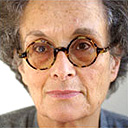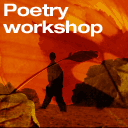
 Ruth Fainlight: "The art of closure and knowing when to stop - these are among the most important skills." |
They all reach a high standard but, apart from any other reason, some were rejected because of anachronistic 'poetic' language (the use of words such as "whilst"); others because of over-emphatic, unnecessarily explanatory endings.
In the case of Ayesha Chatterjee's "A Dramatic Monologue Addressed to No-one On the Topic of Self-Deception", a very accomplished poem is spoiled by the last three lines. Finding the right tone: not throttling the poem but allowing it to breathe, not tying it up and rounding it off and ramming the point home like a preacher or a politician; the art of closure and knowing when to stop - these are among the most important skills.
Shaun Belcher's "On Regarding a Distant Prospect of Oxford with Greyhound in Foreground on a Frosty Morning" and Colm Early's "My Father Once Saw an Old Woman Being Killed in the Autumn" are ambitious pieces which give evidence that their writers have read a lot of poetry and been writing for a long time, but in both cases I think their poems need more thought - either simplification or amplification.
Anne Summerfield's "Self-Administration of the Heimlich Manoeuvre" is a sad, witty and rather macabre short (16-line) poem, which presents the whole scenario of a marriage in economical and telling language. There are interesting half-rhymes - grunt/ bought/ throat - and assonances - forking/ prawns/ four/ bought/ calls and vdu`d/ news/ half-chewed. Can the Heimlich Manoeuvre be self-administered? I hope so - I don`t like to think of this particular character choking to death! Perhaps if it were my poem I would emphasis the problematic nature of the ending by adding either a dash ( - ) or three dots (...) to the last line - though I could easily understand if the writer did not agree. Otherwise, this is a very satisfactory piece which seems to have achieved all it set out to do.
A good example of what I hoped this exercise would inspire is Jennifer Harvey's "It's Only When He Turns the Pages, Touches the Paper That His Eyes Light Up". The world of this poem is complex and subtle; with a minimum of given information, the personalities of two men (as well as that of the narrator), and a much larger subject - the decline of a manufacturing city and its "desolate wastelands" - are well evoked. The vivid and very specific images of father and son, each with his own imaginative escape route - the son's scrapbook of photos of "mountain ranges and forests", the father's model boats - establish the poem's emotional tone, which becomes a celebration of human creativity and the capacity to overcome frustration in almost any circumstances. There are good examples of internal rhyme and assonance, and in the first eight lines, two strong patterns of sound are established which continue to the end: keeps/ magazines/ been/ dreams/ these/ streets/ breathed and places/ ranges/ skyscrapers/ gazes/ day.
I have marked a copy of the complete poem, to indicate where I suggest changes (marked in bold). These are slight, dealing with punctuation and capitalisation (perhaps the poem was not proofed carefully enough before being sent out). Where punctuation has been used by the writer, it is standard, and I have followed this style in my alterations, for the sake of consistency.
He keeps a scrapbook of images,
pictures clipped from magazines of places he's never been.
Mountain ranges and forests
skyscrapers and empty boulevards.
He gazes at them and dreams.
Talks of the day when he will go there,
imagines sometimes he has walked these streets,
breathed unfamiliar mountain air.
Thoughts of these far off worlds
make his eyes shine
make the days pass.
We are on a train
on our way to visit his father.
As we rush through the city
pushing past railway sidings
and on through desolate wastelands
we stare at the craters
where the shipyards used to be.
Empty and forlorn, no-one remembers them
as they used to be.
Save for his father.
This is a damaged landscape
hit hard by progress
by winds of change
that no-one saw coming.
In the living room
his father sits at a table
scraps of wood and metal spread before him.
He's assembling them,
piecing together these fragile little boats
and when we enter he doesn't look up.
Paintbrush in hand
he continues applying a splash of red to a sail.
Eyes bright and focused,
he fixes the sail to the mast
and another day has passed.
The one place where I think the poet might consider cutting a line entirely is in the Following four lines, at the repetition of "used to be":
where the shipyards used to be.
Empty and forlorn, no-one remembers them
as they used to be.
Save for his father.
My suggestion would be to have it read:
where the shipyards used to be.
Empty and forlorn, no-one remembers them,
save for his father.
On Regarding a Distant Prospect of Oxford with Greyhound in Foreground on a Frosty Morning, by Shaun Belcher
Tuesday October 19, 2004
Guardian Unlimited
And the park phosphorous in a pink dawn
The dog stands motionless, half dead
A sign for speed unread, unseen
And a dozen crows lift off behind it
Replaying a Breughel painting
And the air seems to vibrate with their wings
As silent you stand entranced, enmeshed
In a frame of the last century
Before the coronation or the foundry spat blood
Mincing your arm to a pulp
Between the stamping press's glittering steel
And now one-armed you stand beside your dog
Calling it to run headlong into history
On a morning when nothing much moves
Even the container lorries are stacked up at Dover
You both stand and glint on the edge of this city
Your boots glazed with the frost
The dog's blinking the only movement
It's heart racing, a suburban Stubbs
We are all glued to our place in the scheme
Like hares glued to the rails
You and I and that dog are measured by a painter's eye
as shares flicker on screens beyond us.
click here for Guardian pages |
|

